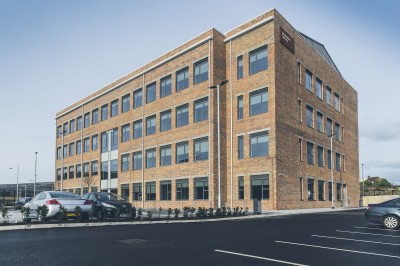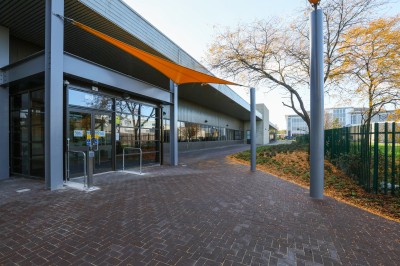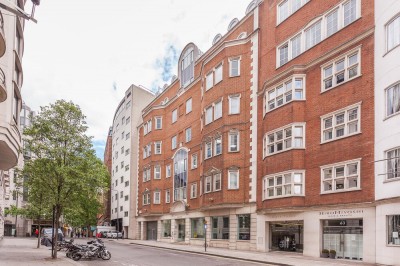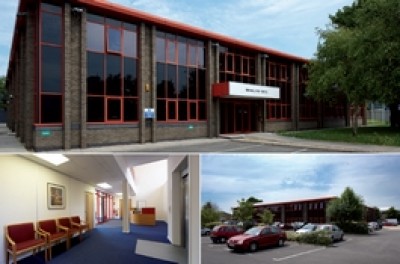The UK is home to one of the largest serviced office markets in the world, with industry estimates putting its value at over £120 billion by 2025. The past 5 years has seen an evolution in workspace trends and a sizeable shift in what businesses want and need from their office space, with a greater focus on a more inspiring working environment, a closer focus on staff wellness and the opportunity to benefit from collaboration with like-minded businesses. In the same period, the flexible workspace market has adapted to cater for the changing trends, resulting in exponential annual growth since 2014, with a larger supply and a higher demand for serviced offices, managed offices and coworking spaces than ever before. Companies working in serviced offices also have a greater proportion of the workforce under the age of 35, suggesting that it’s a rising trend amongst millennials and other younger workers.
There are plenty of advantages to using serviced offices. They provide all the facilities and amenities a business needs to become fully operational on day one, as well as offering networking opportunities to foster business growth. Serviced offices are a cost-effective and adaptable way to create a physical home for your business without being tied into an expensive long-term commitment.
So, it’s pretty clear that serviced offices are here to stay. In fact, the rising number of start-ups and the shift to a more flexible way of working means that it’s likely that the serviced office market will continue to grow.
And with that in mind, we’ve created this article to share everything you need to know about serviced offices. Let’s jump on in and get started.
What is a serviced office?
A serviced office, also referred to as managed offices, flexible offices or business centres, is an office that is fully operational and ready-to-go from day one. Delivered fully furnished, serviced offices are run and maintained by an operator and cater to businesses of any size looking for flexibility. Often the pre-conception is that a serviced office is a small, temporary office for small businesses. In fact, quite the contrary. Businesses can rent a serviced office for up to 36 months, ranging in size, from a small 1 desk office through to self-contained whole floors ideal for larger businesses.
Compared to hotels by the Financial Times, the exponential growth of the global flexible office market and the changing trends in business needs has put serviced offices at the forefront of the global shift in how modern businesses utilise their office space. Serviced offices are ideal for start-ups and SMEs looking for the flexibility to expand and contract when they need to, thus only paying for the space they need at any one time. However, the shift in global trends and current economic climate, has also seen a huge increase in the number of larger businesses and global corporations choosing to rent a serviced office, instead of committing to a costly, long term lease.
What are the benefits of serviced offices?
Flexibility
Perhaps the key benefit of renting a serviced office is its flexibility. The rapidly evolving economic landscape means businesses can no longer plan too far in advance, so commitment to a traditional leased office, typically a minimum 5 year term, becomes unfeasible. The short-term nature of serviced office leases means businesses can remain agile. With contract terms from as little as one month, typically to a maximum of 3 years, and the ability to scale up or down at any point, it is of little surprise that serviced offices have become the go to solution for businesses of all shapes and sizes.
Scalability
Scalability is paramount to fast growing businesses and those with fluctuating staffing needs. Rather than future proofing projected growth and subsequently paying for unused space while growing into the office, serviced offices are a cost effective way of avoiding wasted capital by only paying for space being used, with an option to take a larger or smaller office at any time. This is one of the reasons why a large proportion of businesses from the Tech and Fintech sectors, as well as large corporate organisations and a growing number of global blue-chip companies have become perennial serviced offices tenants.
Office Management
The day to day running of your office space is a job in itself. When renting a leased office space, businesses will need to organise all the key components to a fully functioning office, which typically includes a fixed term contract on items such as utilities, office equipment and telecommunications infrastructure, as well as paying business rates, service charge, insurances, cleaners and ad hoc maintenance costs. This is after the initial setup of the office which will often include a bespoke fit-out and furnishing the space. Serviced offices are designed to take this hassle away from you, offering peace of mind to focus solely on the running of your business. All of the aforementioned items are provided and maintained by the serviced office provider and fully included within the monthly rent. Why have the ongoing task of maintaining your office and having numerous monthly bills to pay when someone else can do it for you, for one all-inclusive monthly cost!
Facilities
Gone are the days of serviced office having bland, basic facilities that offered little more than meeting rooms, a kitchen area and printing/photo copying. As day to day needs of the modern business evolve, so do serviced offices which now offer an unrivalled and incredibly diverse array of facilities. Alongside well-appointed meeting rooms, fully stocked kitchens and printing/photo copying facilities, most serviced offices now offer spacious break-out areas, complimentary refreshments, phone booths, business lounges, event spaces, quiet ‘thinking’ rooms, wellness programs and even roof terraces that provide the perfect escape from the office and often stunning views. Perhaps one key benefit that often goes under radar is the ability to network with like-minded individuals and businesses through community networking events.
What are the costs for serviced offices?
The costs for renting serviced offices are deliberately made simple. One all-inclusive monthly rent covering all costs associated with running an office, paid in one monthly direct debit. As eluded to earlier, a traditional lease requires all bills to be paid separately, with the admin intensive task of organising and maintaining contracts and payment with respective suppliers for items such as rent, business rates, service charges, utilities, insurances, telecommunications. A serviced office incorporates all of these costs, and more, within one transparent monthly cost.
Typically, serviced office costs include:
- Rent
- Business Rates
- Service Charge
- Utilities
- Office furniture
- Telecoms connectivity
- Buildings insurance
- Reception services
- Maintenance
- Daily cleaning
- Complimentary Tea & Coffee
Costs for renting serviced offices in London and throughout the UK can vary significantly provider by provider and will very much depend on variables such as the quality of space, the facilities within the building, the size of the office, the location and the length of term. All prices are subject to negotiation. Check out our individual Area Guides for further guide pricing.
Do serviced offices have additional costs?
While it is worth considering the potential for additional costs, there would only ever be additional costs for services available to utilise on an ad hoc basis. This includes features like:
- Internet Usage: Internet connectivity is almost always included within the monthly rent of a serviced office, however, any additional bandwidth needed may be chargeable. Packages and prices vary building by building and will be provided bespoke to individual business needs.
- Telephone usage: Telephone handsets and telephone numbers can be provided upon request. Some providers offer handsets as part of the monthly rent and others charge an additional monthly cost. In most cases, telephone call charges will be payable and often at standard BT business rates. It is also entirely possible for tenants to bring in their own VOIP telephone system.
- Setup charges: You may be asked to pay a one-off setup cost for setting up your office. This is usually an admin charge for setting up internet and phone lines or having key cards made.
- Front desk: General usage is typically free but call filtering and message collection may be chargeable. This varies from provider to provider, so be sure to do your research beforehand if it’s a deal breaker.
- Postal services: Some serviced office providers will take care of your mail for you, including sending items when no stamps are supplied. Receiving mail is typically free, but sending items is usually chargeable.
- Meeting rooms: All serviced offices will charge to hire meeting and conference rooms. They are typically chargeable by the hour, half day or full day. Catering services are also available within meeting room bookings and this would also be a nominal ad hoc cost to consider.
- Parking spaces: Parking facilities very much depend on the location of the property. Typically, in many towns and villages across the UK, on-site parking is free. However, most serviced offices situated in major UK cities would typically have less parking spaces on offer, if any at all, and as such will charge a monthly fee per parking space.
The best way to avoid any confusion over additional costs is to ask your provider for a complete list of charges before using any of the services. Be sure to do it before signing an agreement so that you understand the full cost implications of moving into the space.
What do serviced offices normally include?
The services and equipment that come as standard with serviced offices are one of the main reasons why so many businesses choose to use them over traditional leased office spaces. You get all the basics you need to become fully operational, with features including:
Office furniture
You can expect most serviced office providers to include desks, chairs, pedestals and storage units as standard. You won’t have to worry about assembling any furniture, so you can focus on bringing in any additional equipment you need to fulfil your individual needs and become fully operational.
Telephone and internet
Line rental and a basic internet connection are usually included in the monthly rent. Both shared and dedicated bandwidth is available, with packages built bespoke to each tenants needs. Typically, there will be two robust internet lines coming into each building, one to use solely as a fail over line in the rare event that the main connection goes down. General telephone costs cover rental of the handset, telephone number and incoming calls, leaving you responsible for covering outgoing call charges. Most buildings will use standard BT Business Rates.
Technology
In most cases, you’ll be expected to provide your own computers and devices, although some providers can source technology hardware such as computers, tv’s, conference call equipment and spider phones. Costs will be passed to you directly from suppliers and not at a premium.
Meeting rooms
One of the main benefits of using a serviced office is the ability to book meeting rooms at very short notice to ensure team or client meetings are held in a well-equipped, fully maintained and professional environment. Audio-visual equipment and catering services are available as well. They tend to operate on a pay-as-you-go basis, booked and charged on an hourly, half day or full day rate and normally need to be booked in advance. Prices will vary per operator and price lists can be made available upon request.
Business services
Business services include things like secretarial services, couriers, travel services, stationery supplies and telephone answering services, all usually chargeable on a pay as you go basis.
Catering
Catering services are usually limited to meeting room users but can also be offered should you being holding an event within the building.
What is the difference between serviced offices and a coworking space?
Serviced offices aren’t the only option available to businesses looking for a base to operate from. Coworking spaces are another alternative, and you may even find that some serviced offices that offer private offices as well as coworking spaces in the same building. Both benefit from flexible terms and all-inclusive pricing, as well as office furniture and internet connectivity. However, there are some important differences between the two worth noting:
Privacy
Serviced offices are typically private offices under lock and key and contracted to one business for a fixed term. Co-working space is a shared working environment where different business sit together in a large open plan area. Some businesses need privacy to ensure confidentiality, while other businesses, most notably tech and creative businesses and particularly freelancers and small businesses for up to 5 people, thrive in a shared co-working environment.
Cost
The costs for a coworking space work in a very similar way to a private serviced office. One all-inclusive monthly cost, per membership per month, covering all bills associated with occupying a workspace as well as office furniture, use of all building facilities and internet connectivity. Typically, you will find coworking space to be cheaper than renting a serviced office. Interestingly, a worldwide study found that both coworking spaces and serviced offices are more affordable than traditional office space.
Networking
The very nature of coworking offices encourages business to collaborate with each other and often results in coworking space occupiers benefiting more frequently from networking than private office tenants. That said, regular networking events are put on by the operator to bring the whole community together and encourage collaboration and business growth.
Who uses serviced offices?
One of the big reasons why serviced offices are so popular is that they can accommodate any business of any size. Just a few of the company types that they’re suited for include:
Start-ups
Flexible terms make renting a serviced office the ideal choice for start-up businesses and entrepreneurs. It enables them to manage their costs more accurately without committing to a long-term commitment that traditional office leases require. It’s perfect for the fast-paced environments that start-ups thrive in.
SMEs and fast growing businesses
Small, established businesses and SMEs can become restricted in a traditional office space if they achieve and exceed their business targets. They remain tied into a contract that doesn’t offer the flexibility they need to expand. Serviced offices allow businesses to remain agile, offering the opportunity to upsize or downsize according to evolving needs.
Corporates
Larger companies, particularly international businesses, have always used serviced offices to establish satellite offices around the globe, ideal for short-term projects and regional teams. However, with changing attitudes to the workplace and the need for greater agility and flexibility, more global corporations and blue chip companies are choosing to rent a serviced office than ever before. This interesting trend is expected to continue to grow for some years to come.
Conclusion
Now that you know everything you need to know about serviced offices, the next step is for you to go ahead and to make them a part of your ongoing strategy. They’re not the perfect choice for every situation, of course, but they do come with plenty of flexibility which makes them a pretty good choice in a variety of circumstances, and even when you just don’t know what the future is set to bring.
The good news is that the tips that we’ve shared in this article will help you to get started, and so all that’s left for you to do is take a look at which serviced offices are on the market in the areas in which you operate. It’s worth knowing that serviced offices are there even if you’re not planning to use them in the immediate future, because they’re also a resource that you can tap into as and when you need it. Good luck – and enjoy your serviced office.
Looking for serviced office space to rent in London or across the UK? Get in touch with our professional and experienced team who will work closely with you to find the ideal office space for your business.







